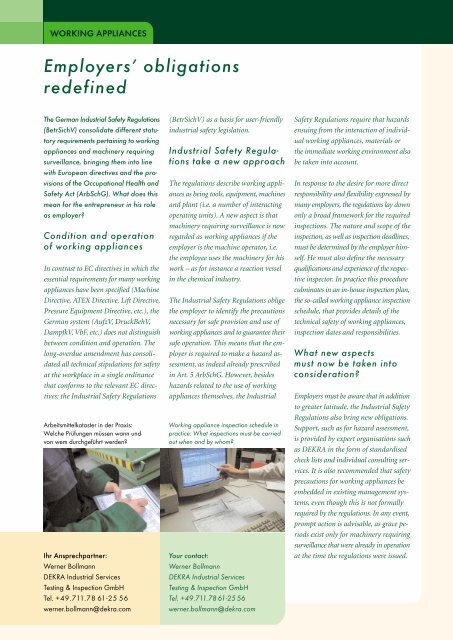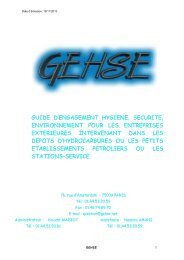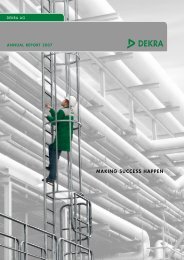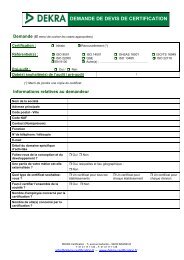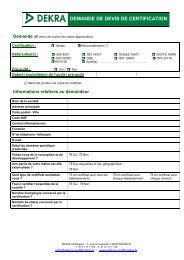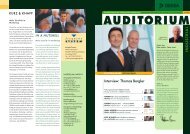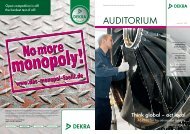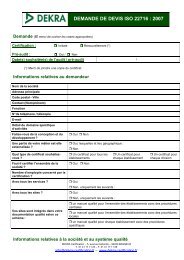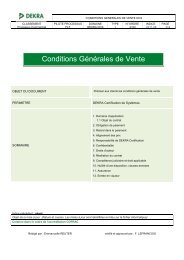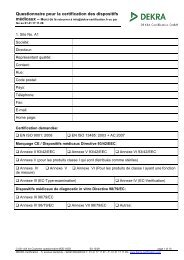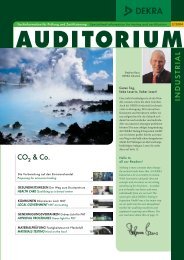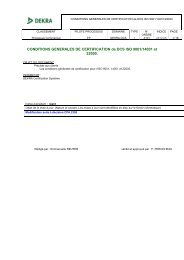auditorium - DEKRA Certification
auditorium - DEKRA Certification
auditorium - DEKRA Certification
Erfolgreiche ePaper selbst erstellen
Machen Sie aus Ihren PDF Publikationen ein blätterbares Flipbook mit unserer einzigartigen Google optimierten e-Paper Software.
WORKING APPLIANCESEmployers’ obligationsredefinedThe German Industrial Safety Regulations(BetrSichV) consolidate different statutoryrequirements pertaining to workingappliances and machinery requiringsurveillance, bringing them into linewith European directives and the provisionsof the Occupational Health andSafety Act (ArbSchG). What does thismean for the entrepreneur in his roleas employer?Condition and operationof working appliancesIn contrast to EC directives in which theessential requirements for many workingappliances have been specified (MachineDirective, ATEX Directive, Lift Directive,Pressure Equipment Directive, etc.), theGerman system (AufzV, DruckBehV,DampfkV, VbF, etc.) does not distinguishbetween condition and operation. Thelong-overdue amendment has consolidatedall technical stipulations for safetyat the workplace in a single ordinancethat conforms to the relevant EC directives:the Industrial Safety RegulationsArbeitsmittelkataster in der Praxis:Welche Prüfungen müssen wann undvon wem durchgeführt werden?Ihr Ansprechpartner:Werner Bollmann<strong>DEKRA</strong> Industrial ServicesTesting & Inspection GmbHTel. +49.711.78 61-25 56werner.bollmann@dekra.com(BetrSichV) as a basis for user-friendlyindustrial safety legislation.Industrial Safety Regulationstake a new approachThe regulations describe working appliancesas being tools, equipment, machinesand plant (i.e. a number of interactingoperating units). A new aspect is thatmachinery requiring surveillance is nowregarded as working appliances if theemployer is the machine operator, i.e.the employee uses the machinery for hiswork – as for instance a reaction vesselin the chemical industry.The Industrial Safety Regulations obligethe employer to identify the precautionsnecessary for safe provision and use ofworking appliances and to guarantee theirsafe operation. This means that the employeris required to make a hazard assessment,as indeed already prescribedin Art. 5 ArbSchG. However, besideshazards related to the use of workingappliances themselves, the IndustrialWorking appliance inspection schedule inpractice: What inspections must be carriedout when and by whom?Your contact:Werner Bollmann<strong>DEKRA</strong> Industrial ServicesTesting & Inspection GmbHTel. +49.711.78 61-25 56werner.bollmann@dekra.comSafety Regulations require that hazardsensuing from the interaction of individualworking appliances, materials orthe immediate working environment alsobe taken into account.In response to the desire for more directresponsibility and flexibility expressed bymany employers, the regulations lay downonly a broad framework for the requiredinspections. The nature and scope of theinspection, as well as inspection deadlines,must be determined by the employer himself.He must also define the necessaryqualifications and experience of the respectiveinspector. In practice this procedureculminates in an in-house inspection plan,the so-called working appliance inspectionschedule, that provides details of thetechnical safety of working appliances,inspection dates and responsibilities.What new aspectsmust now be taken intoconsideration?Employers must be aware that in additionto greater latitude, the Industrial SafetyRegulations also bring new obligations.Support, such as for hazard assessment,is provided by expert organisations suchas <strong>DEKRA</strong> in the form of standardisedcheck lists and individual consulting services.It is also recommended that safetyprecautions for working appliances beembedded in existing management systems,even though this is not formallyrequired by the regulations. In any event,prompt action is advisable, as grace periodsexist only for machinery requiringsurveillance that were already in operationat the time the regulations were issued.


